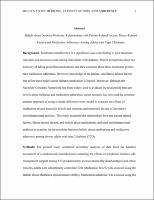Please use this identifier to cite or link to this item:
https://hdl.handle.net/20.500.12202/6909| Title: | Beliefs about Diabetes Medicine: Relationships with Patient-Related Factors, Illness-Related Factors and Medication Adherence Among Adults with Type 2 Diabetes |
| Authors: | Gonzalez, Jeffrey S. Phillips, Alison Walker, Elizabeth Feldman, Jonathan Swencionis, Charles Asman, Arielle |
| Keywords: | clinical psychology health sciences psychology Diabetes Polynomial Regression adherence medication beliefs |
| Issue Date: | Aug-2020 |
| Citation: | Asman, A. (2021, June). Beliefs about Diabetes Medicine: Relationships with Patient-Related Factors, Illness-Related Factors and Medication Adherence Among Adults with Type 2 Diabetes (Publication No. 28549307) [Doctoral Dissertation, Yeshiva University]. PQDT |
| Abstract: | Background: Treatment nonadherence is a significant issue contributing to poor treatment outcomes and increased costs among individuals with diabetes. Patient perceptions about the necessity of taking prescribed medications and their concerns about these medicines predict their medication adherence. However, knowledge of the patient- and illness-related factors that affect these beliefs about diabetes medication is limited. Moreover, although the Necessity-Concerns Framework has been widely used to evaluate the relationship between beliefs about medicine and medication adherence, recent research has criticized the common analytic approach of using a simple difference score model to examine the effects of medication-related necessity beliefs and concerns and promoted the use of alternative multidimensional analyses. This study examined the relationships between patient-related factors, illness-related factors, and beliefs about medications, and used multidimensional analyses to examine the relationships between beliefs about medications and medication adherence among diverse adults with type 2 diabetes (T2D). ______ Methods: The present study conducted secondary analyses of data from the baseline assessment of a randomized controlled trial evaluating the effects of telephonic diabetes self-management support among 812 predominantly socioeconomically disadvantaged and ethnic minority adults with suboptimally controlled T2D. Medication beliefs were assessed using the Beliefs about Medicines Questionnaire (BMQ). Medication adherence was assessed using the Adherence to Refills and Medications Scale-Diabetes (ARMS-D). Relationships between patient-related and illness-related factors with medication beliefs were examined using linear regressions. Polynomial regression was used to examine the relationship between medication beliefs and medication adherence. ______ Results: Hispanic ethnicity (β=.15 p<.01), insulin use (β=.11 p<.05), and higher number of medications (β=.12 p<.05) were significantly associated with stronger beliefs about the necessity in taking medications, while higher level of education (β=-.09 p<.05) was associated with weaker necessity beliefs. Lower income (β= -.09 p<.05) and Hispanic ethnicity (β=.13 p<.01) were significantly associated with greater concerns about medications. None of the illness-related variables were significantly associated with medication concerns. Confirmatory polynomial regression rejected the use of the difference score model. Exploratory polynomial regression determined the quadratic model to be the best fit to test the relationship between medication-related necessity and concern beliefs and adherence. ______ Discussion: Individuals with indicators higher socioeconomic status (higher level of education and income) reported less perceived need and less concerns about their medications. Participants with indicators of worse disease severity (insulin use and higher number of prescribed medicines) as well as those identifying as Hispanic both reported greater perceived need for their medications; however, Hispanic participants also reported greater concerns about their diabetes medications. Confirmatory polynomial regression showed the difference score model to be an inappropriate fit in examining the relationship between medication beliefs and type 2 diabetes medication adherence. Exploratory analyses demonstrated higher-order polynomial models to be a superior fit over the linear terms and concluded that low concerns are necessary but not sufficient for adherence and having both low concerns and high necessity beliefs is optimal for good adherence. The current study’s use of improved methodological analyses to examine the relationship between medication beliefs and adherence significantly adds to the body of literature and also demonstrates the complex nature of the relationship between beliefs about medication and adherence in adults with type 2 diabetes. |
| Description: | Doctoral dissertation, PhD / Open access |
| URI: | https://hdl.handle.net/20.500.12202/6909 https://ezproxy.yu.edu/login?url=https://www.proquest.com/dissertations-theses/beliefs-about-diabetes-medicine-relationships/docview/2557837859/se-2 |
| Appears in Collections: | Ferkauf Graduate School of Psychology: Doctoral Dissertations |
Files in This Item:
| File | Description | Size | Format | |
|---|---|---|---|---|
| Asman Arielle Dissertation_FINAL PDF OA August 2021 Ferkauf.pdf | 1.33 MB | Adobe PDF |  View/Open |
This item is licensed under a Creative Commons License

